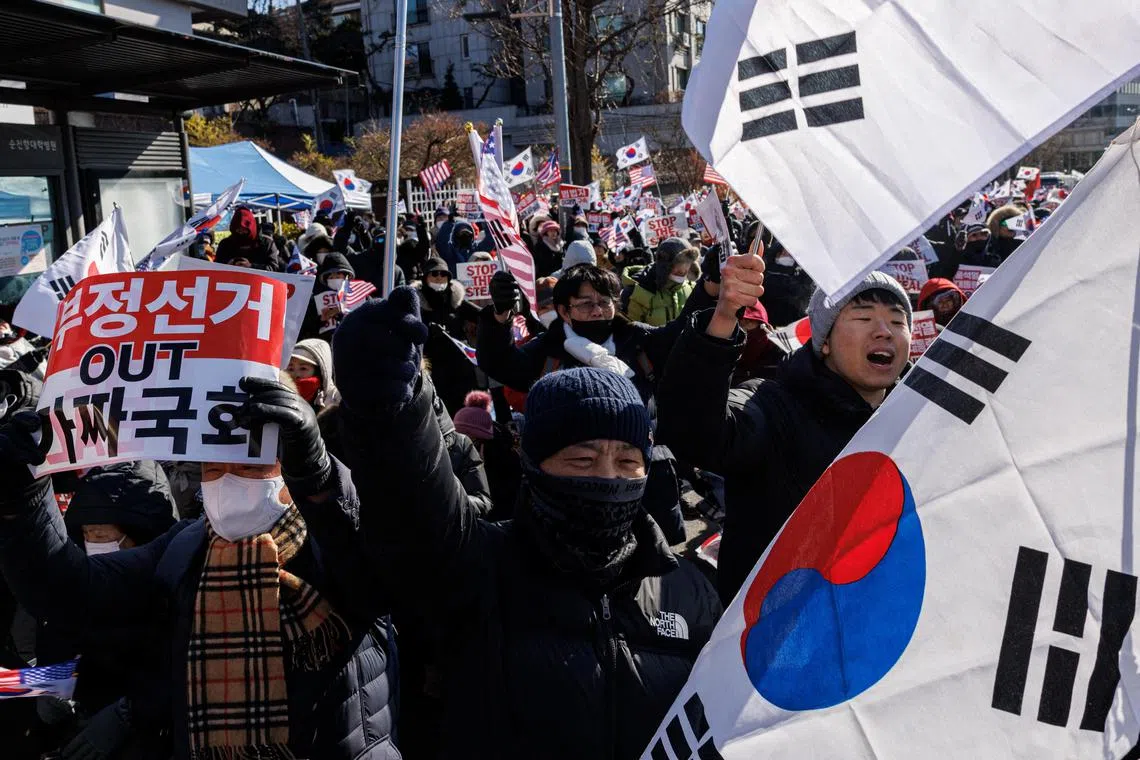Thousands of South Koreans protest as President Yoon Suk Yeol digs heels in
Sign up now: Get insights on Asia's fast-moving developments

President Yoon Suk Yeol's supporters rallying outside his residence early on Jan 11 before a major demonstration in central Seoul.
PHOTO: REUTERS
Follow topic:
SEOUL - Thousands of South Koreans gathered for rival demonstrations in the capital Seoul on Jan 11, as investigators prepare another attempt to arrest suspended President Yoon Suk Yeol over his short-lived martial law decree.
Mr Yoon resisted arrest in a stand-off between his guards and investigators
Demonstrators, both against and for Mr Yoon, were scheduled to gather in sub-zero conditions along major roads in the centre of Seoul on Jan 11 – either demanding his arrest or calling for his impeachment to be declared invalid.
The country has bristled with tension for weeks after Mr Yoon directed soldiers to storm Parliament, where they unsuccessfully tried to prevent lawmakers from voting down martial law.
Since being impeached
“Despite our efforts, he continues to evade accountability, and both the police and the CIO (Corruption Investigation Office for High-ranking Officials) have really failed to act decisively,” said anti-Yoon protester and student Kim Min-ji, 25.
“It is crucial for us to raise our voices until he is removed from office.”
Yoon supporter Su Yo-hahn, 71, said there were “valid reasons” for the sitting President’s martial law declaration, which he alleged was to root out anti-state forces.
“He is someone who was elected by the people and represents our country. Saving Yoon is the way to save our nation,” said Mr Su.
Mr Brandon Kang, a 28-year-old Yoon supporter, told AFP he liked the President because he found him “quite similar to US President-elect Donald Trump, which I really... appreciate”.
Mr Yoon’s supporters rallied outside his residence before major demonstrations for and against him were held in central Seoul.
The pro-Yoon side waved South Korean flags, while rainbow headbands were seen on the side advocating his removal.
If the warrant is executed, Mr Yoon would become the first sitting South Korean president to be arrested.
His presidential security chief, Mr Park Chong-jun, resigned on Jan 10 as he faced questioning over why his guards had blocked Mr Yoon’s arrest.
The Presidential Security Service (PSS) guards, including military troops, had shielded Mr Yoon from investigators in a six-hour stand-off.
Mr Park was again questioned on Jan 11 while acting PSS chief Kim Seong-hun refused to turn up for a third summons, opening him to possible arrest.
“Kim Seong-hun... cannot leave his post for even a moment regarding presidential security matters,” the PSS said in a statement.
Mr Kim, who is considered to be more of a hardliner than his predecessor, Mr Park, is expected to lead efforts to prevent the execution of the second arrest warrant, if he avoids being arrested.
Mr Lee Jin-ha, the PSS’ head of security and safety, also appeared for police questioning on Jan 11.
Far-right youth
The CIO said it will “prepare thoroughly” for its second attempt to arrest Mr Yoon and warned that anyone obstructing it could be detained.
The National Office of Investigation, a police unit, has sent a note to high-ranking police officials in Seoul requesting that they prepare to mobilise 1,000 investigators for the fresh attempt, Yonhap reported.
Meanwhile, Mr Yoon’s guards have reinforced his Seoul compound with barbed wire installations and bus barricades.
Separate from the insurrection probe, Mr Yoon also faces ongoing impeachment proceedings.
Lawmakers have already suspended him, but the Constitutional Court will decide whether to uphold this decision or restore him to office.
The court has slated Jan 14 for the start of his impeachment trial, which will proceed even in his absence.
Polls show that approval ratings for Mr Yoon’s ruling party have been rising
On Jan 10, opposition parties submitted a resolution demanding the expulsion of a ruling People Power Party lawmaker who had arranged a press conference in Parliament for a far-right youth group named the Anti-Communist Youth Corps.
Lawmaker Kim Min-jeon faced criticism for associating with the group, which has dubbed one of its units “Baekgoldan”, the name of a highly controversial police unit that cracked down on democracy protesters in the 1980s and 1990s. AFP

